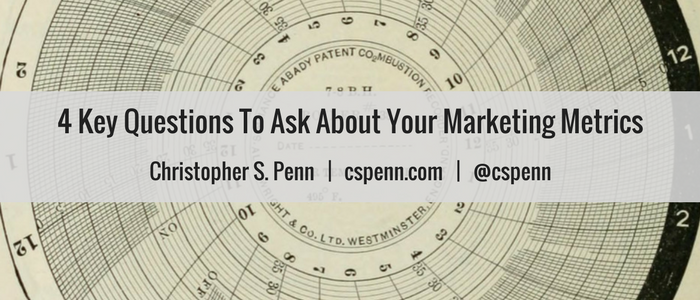In my work as a public speaker, I’m privileged to talk to so many marketers about their marketing and measurement challenges. One consistent theme that keeps cropping up is about metrics, and more importantly, the use of them in our marketing. With so much data, what should we pay attention to? What should we or shouldn’t we measure? What’s important?
There are 4 key questions we should ask about our marketing metrics and analytics that will help us understand which metrics are most important.
How valuable is the metric?
One of the best places to start in any discussion of metrics is to figure out where the metric comes from and how valuable it is. As a general rule of thumb, the more valuable a metric is, the harder it is to obtain.
For example, knowing how many Twitter followers we have is a very easy number to come by. Knowing how many Twitter followers are active prospects for our business is significantly harder (and more valuable), since it involves tying together Twitter and our CRM – but knowing this helps us understand whether Twitter helps us advance sales.
A second rule of thumb: the more we can tie any metric to business impact, the more valuable it is.
What does the metric mean?
Metrics by themselves are meaningless, even if they’re reliable and valuable, if we don’t understand their value to our business. For example, one of the more useful statistics in web analytics is absolute unique visitors to our website. This number tells us an approximation of how many human beings actually laid eyes on our site.
What does this mean? By itself, not much. We can tell day to day or week to week that it’s going up or down, but if we have no other context or framework for it, it’s largely unhelpful. Once we put it in the context of a marketing operations funnel, however, it becomes more meaningful.
Audience numbers lead to prospects, which lead to leads, which lead to sales, which lead to repeat customers, which lead to evangelists, which lead back to more audience.
For example, absolute unique visitors is a metric near the top of our funnel, the prospective customers who walk into our online shop to browse. They wouldn’t be there if there wasn’t some tiny sliver of interest in who we are and what we have to offer. If no one is walking into our shop, the best conversion metrics are useless. Conversely, if we have crowds of people walking into our shop daily, we shift our focus to lead generation or customer conversion.
A third rule of thumb: every meaningful metric has a subsequent meaningful metric that provides even more value.
Why did this metric behave in the way it did?
Our third question focuses on why – why did we achieve the results we did? If we don’t understand why a metric happened, why we saw the results we saw, then we have no chance of fixing it or improving it. If absolute unique visitors went up, why? If conversions went down, why?
One of the most challenging aspects of metrics analysis is determining why. The data by itself will not tell us. We might see hints, with diagnostic metrics like bounce rate, but the only reliable way to understand why something happened is to ask our customers. Why did you leave your shopping cart? Why didn’t you sign up for our newsletter?
A fourth rule of thumb: we analyze what. We have to ask real people why.
What should we do about it?
This last question is the least asked about metrics, yet is the most valuable of all. If we’re aboard a cruise ship that is taking on water, there are lots of meaningful, valuable metrics. How many people are there aboard, and are there enough lifeboats? How fast is the ship sinking? How much time do we have left?
All of those metrics are totally irrelevant (despite their perceived value) if we’re not actually getting off the sinking ship. We can have the best metrics dashboard in the world, but if we don’t do anything to address the problems our metrics show us, we will fail.
The true power of a metric is to tell you early enough when you need to make changes, and what needs to be changed.
If we’re measuring a marketing funnel, for example, every stage in the funnel past the first one has a cause and effect. The number of leads we generate is caused by how attractive our inbound marketing is or how effective our advertising is, and affects how many sales we make.
If our business is in trouble for any reason, do what Ken Savage of the Winchendon Martial Arts Center advocates for martial artists: look to the immediate previous step to see the mistake we made and what to fix. Not enough sales? Check our lead flow. Not enough leads? Check our inbound audience numbers.
Ask these four questions in order to make sense of the many metrics and data points available to us. If you have a metric that fails the tests these questions ask, put it to the side and work on finding metrics that provide valuable answers to all four questions.
You might also enjoy:
- You Ask, I Answer: AI Works And Copyright?
- Almost Timely News, January 7, 2024: Should You Buy a Custom GPT?
- Almost Timely News, February 11, 2024: How To Evaluate a Generative AI System
- Almost Timely News: Principles-Based Prompt Engineering (2024-02-25)
- Almost Timely News, January 28, 2024: Copyright Must NEVER Apply to AI-Made Works
Want to read more like this from Christopher Penn? Get updates here:
 Take my Generative AI for Marketers course! |



Leave a Reply